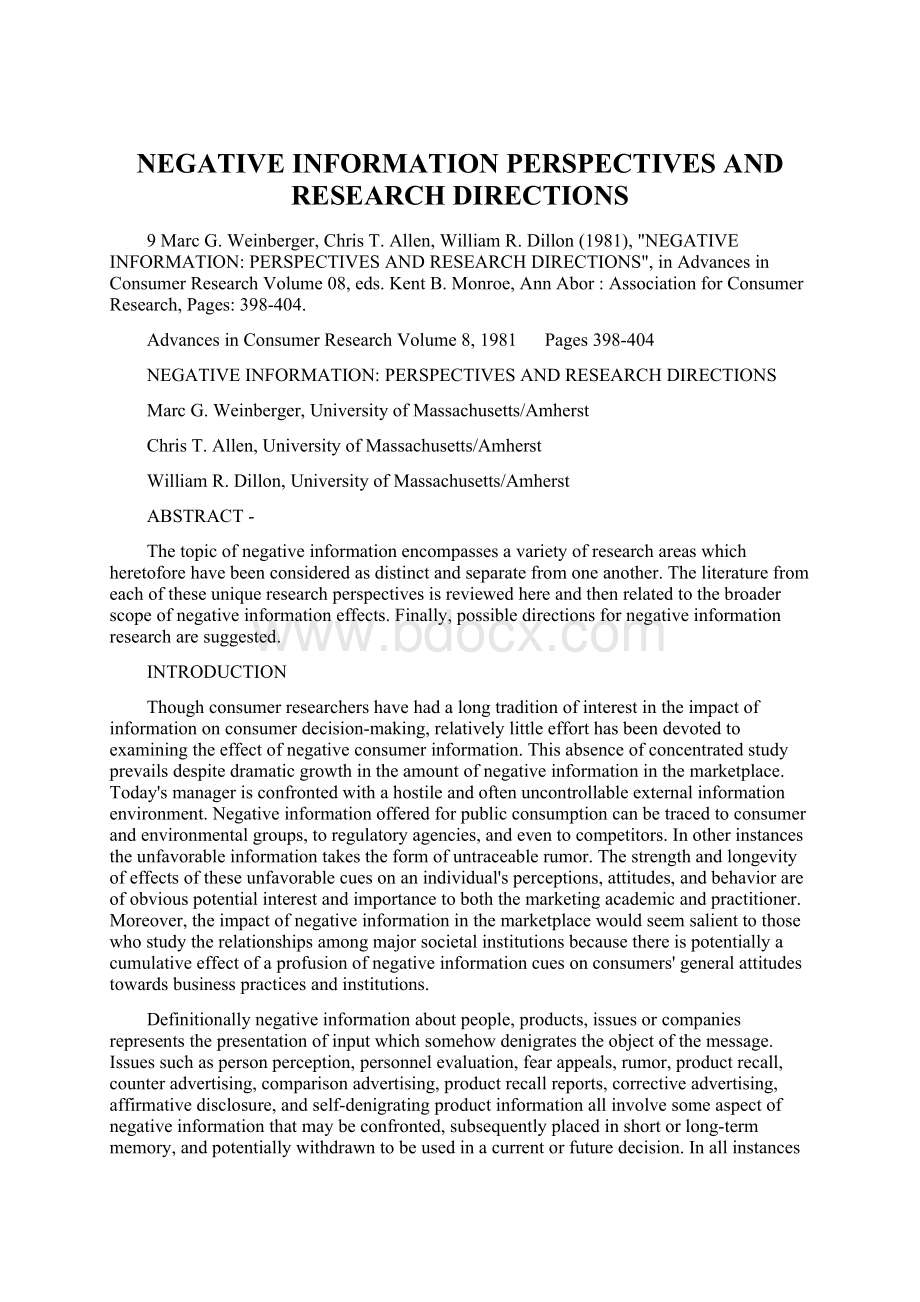NEGATIVE INFORMATION PERSPECTIVES AND RESEARCH DIRECTIONSWord文档下载推荐.docx
《NEGATIVE INFORMATION PERSPECTIVES AND RESEARCH DIRECTIONSWord文档下载推荐.docx》由会员分享,可在线阅读,更多相关《NEGATIVE INFORMATION PERSPECTIVES AND RESEARCH DIRECTIONSWord文档下载推荐.docx(14页珍藏版)》请在冰豆网上搜索。

,inAdvancesinConsumerResearchVolume08,eds.KentB.Monroe,AnnAbor:
AssociationforConsumerResearch,Pages:
398-404.
AdvancesinConsumerResearchVolume8,1981
Pages398-404
PERSPECTIVESANDRESEARCHDIRECTIONS
MarcG.Weinberger,UniversityofMassachusetts/Amherst
ChrisT.Allen,UniversityofMassachusetts/Amherst
WilliamR.Dillon,UniversityofMassachusetts/Amherst
ABSTRACT-
Thetopicofnegativeinformationencompassesavarietyofresearchareaswhichheretoforehavebeenconsideredasdistinctandseparatefromoneanother.Theliteraturefromeachoftheseuniqueresearchperspectivesisreviewedhereandthenrelatedtothebroaderscopeofnegativeinformationeffects.Finally,possibledirectionsfornegativeinformationresearcharesuggested.
INTRODUCTION
Thoughconsumerresearchershavehadalongtraditionofinterestintheimpactofinformationonconsumerdecision-making,relativelylittleefforthasbeendevotedtoexaminingtheeffectofnegativeconsumerinformation.Thisabsenceofconcentratedstudyprevailsdespitedramaticgrowthintheamountofnegativeinformationinthemarketplace.Today'
smanagerisconfrontedwithahostileandoftenuncontrollableexternalinformationenvironment.Negativeinformationofferedforpublicconsumptioncanbetracedtoconsumerandenvironmentalgroups,toregulatoryagencies,andeventocompetitors.Inotherinstancestheunfavorableinformationtakestheformofuntraceablerumor.Thestrengthandlongevityofeffectsoftheseunfavorablecuesonanindividual'
sperceptions,attitudes,andbehaviorareofobviouspotentialinterestandimportancetoboththemarketingacademicandpractitioner.Moreover,theimpactofnegativeinformationinthemarketplacewouldseemsalienttothosewhostudytherelationshipsamongmajorsocietalinstitutionsbecausethereispotentiallyacumulativeeffectofaprofusionofnegativeinformationcuesonconsumers'
generalattitudestowardsbusinesspracticesandinstitutions.
Definitionallynegativeinformationaboutpeople,products,issuesorcompaniesrepresentsthepresentationofinputwhichsomehowdenigratestheobjectofthemessage.Issuessuchaspersonperception,personnelevaluation,fearappeals,rumor,productrecall,counteradvertising,comparisonadvertising,productrecallreports,correctiveadvertising,affirmativedisclosure,andself-denigratingproductinformationallinvolvesomeaspectofnegativeinformationthatmaybeconfronted,subsequentlyplacedinshortorlong-termmemory,andpotentiallywithdrawntobeusedinacurrentorfuturedecision.Inallinstancesanattemptismadetoeitherdiscouragesomebehaviororattitudeandfocusonestablishinganewattitudeorbehavior.
Todateresearchaboutnegativeinformationhasbeenscatteredunderdiverseareasinpsychology,sociologyandmarketing.Asaresultmicroresearchtraditionsrelatedtonegativeinformationissueshavedevelopedwithineachdisciplinewithlittlerecognitionthattheyrelatetoacommontheme.Themajorintentofthispaperistofirstreviewsomeofthemajorparadigmsandconceptualfoundationswhichhavebeenappliedtothestudyofnegativeinformation.Secondly.thispaperwillexamineempiricalfindingsfromavarietyofdisciplineswhichrelatetonegativeinformationeffects.Finally,somesuggesteddirectionsforfutureresearchinthisareawillbeoutlined.Ingeneral,whatislabeledhereasnegativeinformationisnotnovelbutthevisionoftherelatedcomponentissuesunderacommonrubricisnew.
EXPLAININGTHEEFFECTOFNEGATIVEINFORMATION
Differentexperimentalparadigmsandtheoreticalconstructshaveemergedingeneratingandtestingspecifichypothesesconcerningnegativeinformation.Thesimplestandmostwidelyusedresearchparadigmhasbeenimpressionformation.Initsmostprimitivecauseandeffectformastimulustriggerssomebelief,attitudeoractioninasubjectpopulation.Theimpactofmediationalfactorssuchasanxiety,susceptibilitytosocialinfluence,receptivityandsoonarenotofprimaryconcern.Inmostimpressionformationstudiesunfavorableadjectivedescriptionsorscenarioshavebeenthestimuliemployedwiththetargetobjectbeingaknownand/orunknownindividualorgroup.Variationsintheamountandintensityofnegativeandpositivestimulihavebeengaugedusingsimplepaperandpencilmeasuresofliking,behavioralintentionandsoon.Theadvantageofthisapproachtostudyingnegativeinformationhasbeantheabilitytoretainverytightinternalcontrolovertheexperimentalsetting.
Amorecomplexextensionofimpressionformationisattributiontheorywheretheindividualisviewedasabeingwhoperceivesasituation,examinesitforkeyelementsofinformation,andsubsequentlymakesaninferenceaboutastimulusobject(Kelley1973).Todateattributiontheoryhasservedasanexplanationfornegativeinformationaleffectsratherthanasanempiricalparadigm.UsinganattributionalframeworkKanouseandHanson(1971)suggestthatnegativeinformationhasthestrongimpactthatitdoesbecauseitstandsoutmorethanpositiveinformationandinKelley'
sterminologywouldthereforehavemoredistinctiveness.Thisapparentlyresultsfromthefactthattherearemorepositivecuesintheindividual'
ssocialenvironment.Asaresult,negativecuesattractmoreattentionandarethereforemoreheavilyattributabletothestimulusobject.Thisunderestimationofimportantcontextualfactorsisanattributionalphenomenonobservedinbothalaboratorysetting(JonesandNisbett1971)andatthesocietallevel(Lazer1980).
Amoremediationalviewofnegativeinformationeffectsmightbetakenwithbothassimilation-contrasttheoryorthreat-compliancemodels.Bothareconceptualapproachesthathelpexplainthesituationaleffectsofanincomingstimuliinrelationshiptosomesecofindividualpredispositions.Assimilation-contrasttheory(Sherif,SherifandNebergall1965)positsthatpriorexperienceorattitudeofthereceiveranditsrelativepositiontothatadvocatedinthemessagewilldeterminewhetheritisdrawncloserintothereceiver'
ssphere(assimilated)orexpelledfurtheroutsidethereceiver'
sposition(contrasted).Thus,negativeinformationconsistentwiththereceiver'
sbeliefswouldbeassimilatedandthatwhichisincompatiblewouldbecontrastedandrejectedwithsubsequentlowcompliance.Sinceindividualsbringtoasettingsomesetofpredispositionswhichaffecttheirperceptions,theabilitytoassesstheserelevantpredispositionsmighthelppredicttheimpactofnegativeinformation.
InasimilarmediationalveinMcGuire(1968)developedathreat-compliancemodelwheretheimpactofamessageonopinionchangeisafunctionofone'
spredispositiontoreceiveamessage(receptivity)andyielding.Withoutconsideringreceptivityonemightexpectthatgreateranxietyarousalwouldleadtogreateryieldingtoaninfluenceattempt.Whenreceptivityisfactoredinasapotentialmediator,anegativerelationshipbetweenanxietyandpersuasionisexpected.Receptivityaddsanon-monotonicdimensiontoMcGuire'
sthreat-complianceanalysisandemphasizestheneedtoconsiderpredispositionalfactorslikereceptivity.Sincemuchofthenegativeinformationintheconsumercontextrepresentsathreatofvaryingmagnitude,thisconceptualapproachmightbeattractiveindealingwiththesituationalcomplexitiesofmanynegativeinformationcircumstances.
EMPIRICALRESEARCH
Negativeinformationhasbeeninvestigatedmostoftenusingimpressionformationasitsbasicparadigmfocusingonthesubareasofpersonperceptionandpersonneldecisions.
PersonPerception
Psychologistshaveexaminedtheimpactofnegativeandpositiveinformationinthecontextofforminginferencesorimpressionsaboutpeople.Forexample,Goodman(1950)foundthattraitwordssuchas"
cold"
weremorepowerfulininfluencingimpressionsthanpositivetraitwordssuchas"
warm."
Similarly,Osgood.SucciandTannenbaum(1957)foundthat,contrarytotheirproposedcongruityprinciple,equallypolarizedpositiveandnegativeinformationdidnothaveabalancingeffectonimpressionformation;
rather,ineveryinstanceofareportederrorthedirectionofinfluencefavoredthenegativeinformation.
In1965Andersonfoundthatnegativeadjectivesseemmorepowerfulthanpositiveadjectivesetsinaffectingoverallevaluations.Similarly,Feldman(1966)andRichey,McClellandandShinkunas(1967)foundthattheweightgivennegativeadjectivesexceededweightgiventopositiveadjectiveswhenseveralmustbecombinedintooneoverallevaluation.
Othershaveattemptedtoidentifythesituationalvariablesthataffectpersonperception.Thestrongimpactofnegativeinformationoccurredwhenthetargetpersonwasafemaleratherthanamale(RicheyandDryer1970),andwhensvarietyofdifferentpersonalityvariablesweretested(Briscoe,WoodyardandShaw1967).InanexaminationofsituationalmessagevariablesCusumanoandRichey(1970)manipulatedorderandintensityfactorsandRichey,Koenigs,Richey,andFortin(1975)variedamountsofnegativeandpositiveinformation.Inbothstudies,negativeinformationwasmoresalientthanwouldbepredictedusingasimpleaveragingtheory.Inthelatterstudy,onepieceofnegativeinformationeffectivelyneutralizedfivepositivebehaviors.Thegeneralizabilityofnegativeinformationeffectsreceivessupportinacross-culturalstudyconductedinDenmarkwhereBernadetteGray-Little(1978)foundthatDanes,likeAmericans,evinceadisproportionateneg